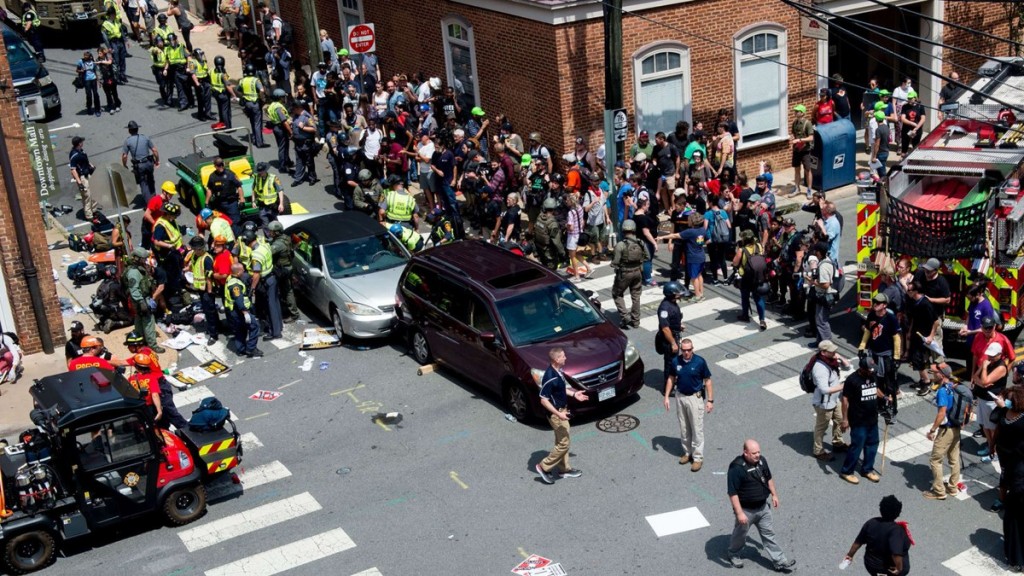By Jennifer Roberts – Mommy Underground
After the tragic events that took place in Charlottesville this past weekend, many Americans are still struggling to make sense of “what happened”. Political pundits and politicians fill the media airwaves, often using the Charlottesville tragedy as a way to promote their political agenda and demonize the other side. And sadly, caught in the crosshairs of the intense emotion are children, many who are still confused or don’t yet understand what happened.
As a parent, it’s heartbreaking to have one’s child be exposed to the evil in the world, although it does exist, parents hope to shield their children from it as long as possible. But, it’s critical to have the tough conversation with your children and explain what happened in Charlottesville and why, without instilling fear.
Having these kinds of conversations aren’t easy, but it is important you take the time to have them with your child. Because regardless if you take the time to explain it to your child or not, they are going to hear it from somebody, and as their parent, you want to make sure your children are hearing directly from you.
But many parents are at a loss for words on how to address the Charlottesville tragedy to their children. After all, it’s a complicated topic, with many different factors and situations which led up to last weekend’s events.
The first thing to remember when talking to your child is your response is determinant on their age. What you share with your 8-year-old, will be drastically different than how you have a conversation with your teenager, who has access to the internet and has most likely been saturated with various opinions and stories explaining the event.
For younger children, who won’t understand, you can keep it quick and simple and explain that sometimes people get angry, and don’t always know how to communicate their feelings. And sadly, sometimes, as a result, they make bad choices or act out in violence.
If your child is older and asks more specific questions such as “What is the Nazi flag”, feel free to explain the history and violence behind that symbol. But also, use it as a chance to explain other countries and terrorist groups (such as ISIS and communist countries), who continue to oppress their people through acts of violence, also use their flag as a symbol, and that’s wrong too.
The tragedy in Charlottesville can create an open door for you to talk with your children about racism and violence, and how neither is ever okay. Reiterate to your children while Americans are free to express their opinions and beliefs, it should never result in violence.
If your child approaches you with something they heard at school, take the time to correct any misinformation. In addition, while it’s important to talk about what happened, it’s crucial to balance talking about it vs. being obsessed. Yes, you must address the issue with your child, but avoid having 24/7 news coverage blaring in your home.
And remember, your child can sense how you are handling the situation. If you are anxious or hysterical, your child will pick up on that, and may become anxious too. It’s important when explaining what happened to speak in a calm voice. Of course, you can admit you feel sad about the events, as any loss of life or act of violence is always sad.
Most important, your child wants to know they are safe. While as a parent one can never guarantee safety in this world, take the time to reassure your child as their parent you will do whatever you can to protect them, and let them know they are loved.
Use this as an opportunity to reinforce your family values of love, joy, peace, patience, kindness, goodness, faithfulness, gentleness, and self-control, as a contrast to show what can happen if a person gets angry and doesn’t know how to deal with their anger.
Remind your child violence and hate are never acceptable, and that every human life matters, and has value. Teach your child to love and respect people who are different from them. Explain to them the difference between good and bad choices.
If you do it right, you can use the horrific event as an example to your children of how not to treat people. Reinforce the golden rule to “do unto others, as you would have them do unto you”. And let them know you’re always available if they want to talk or process what happened in Charlottesville. The main key is balance, sheltering your children won’t help, but there’s no need to create panic and fear either. Have you had a conversation with your children regarding Charlottesville yet?








